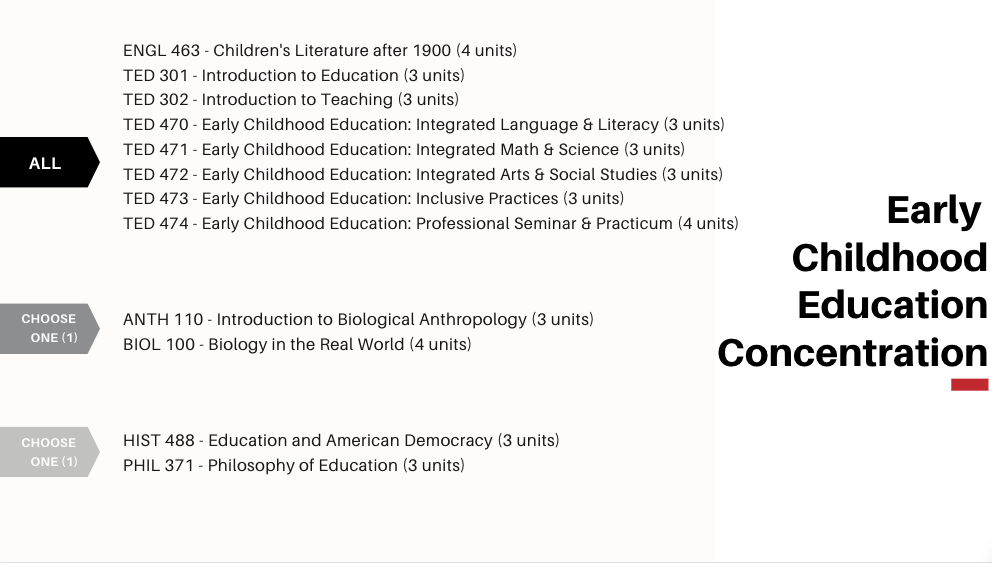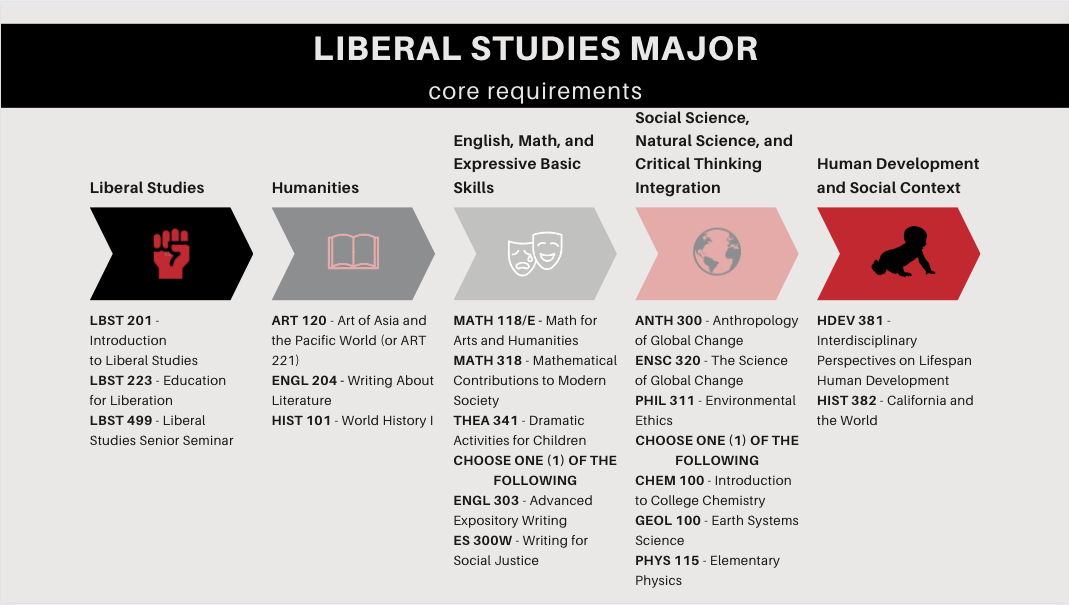Early Childhood Education
Image Credit: Rafael Lopez, New Children's Mural for Children's Memorial Hospital, Chicago
The Early Childhood Education (ECE) concentration prepares students to become teachers in preschool to third grade (PK-3) settings. The ECE concentration is 32-33 units. Completion of 24 ECE units at the undergraduate level and a multiple subject credential will potentially allow a student to self-nominate for the PK-3 Early Childhood Specialist Credential, still under review by the CTC.
EARLY CHILDHOOD EDUCATION ROADMAP
Select one (3-4 units):
- ANTH 110 - Introduction to Biological Anthropology (3) GE-B2
- BIOL 100 - Biology in the Real World (4) GE-B2, GE-B3
Select one (3 units):
- HIST 488 - Education and American Democracy (3) GE-UD-C
- PHIL 371 - Philosophy of Education (3) GE-UD-C
Complete one (4 units):
- ENGL 463 - Children’s Literature after 1900(4)
Complete all (22 units):
- TED 301 - Introduction to Education (3)
- TED 302 - Introduction to Teaching (3)
- TED 470 - Early Childhood Education: Integrated Language & Literacy Development (3)
- TED 471 - Early Childhood Education: Integrated Math and Science (3)
- TED 472 - Early Childhood Education: Integrated Arts and Social Studies (3)
- TED 473 - Early Childhood Education: Inclusive Practices (3)
- TED 474 - Early Childhood Education: Professional Seminar and Practicum(4)

Early Childhood Education
Students in the ECE concentration earn 16 units in Early Childhood Education, a practical, hands-on program to prepare students for advancing on the California Permit Matrix (birth to 5 years old) as well as for students who want to teach in the younger grades (PK-3) of an elementary school. The TED 470-474 courses help develop professional experiences to work with children, families and communities.
This program caters to the working teacher and classes are intended to be taught online on Saturdays from 9am until 4pm. We utilize Zoom for synchronous and asynchronous sessions as much as possible. The ECE course sequence begins in the Fall and can be completed in three semesters. Benefits of the program include a solid foundation in research and pedagogy delivered by experienced and professional faculty.

Liberal Studies Major Requirements (71-80 units)
Core Requirements
Liberal Studies majors must complete the following core coursework as outlined. Please note that the core requirements also satisfy the upper-division GE requirements in areas C4, D4, and B6.
Liberal Studies Courses
Complete all (9 units):
- LBST 201 - Introduction to Liberal Studies (3)
- LBST 223 - Education For Liberation (3) GE-F-ES; Social Justice
- LBST 499 - Liberal Studies Senior Seminar (3)
Humanities Courses
Complete all (10 units):
- ART 120 - Art of Asia and the Pacific World (3) GE-C1 (or ART 221)
- ENGL 204 - Writing About Literature (4) GE-C2
- HIST 101 - World History I (3) GE-C2
English, Math, and Expressive Basic Skills Courses
Select one (3-4 units):
- ENGL 303W - Advanced Expository Writing (4) UWR
- ES 300W - Writing for Social Justice (3) GE-UD-C; Social Justice; UWR
Complete both (6 units):
- MATH 318 - Mathematical Contributions to Modern Society (3) GE-UDB; Social Justice
- THEA 341 - Dramatic Activities for Children (3) GE-UD-C
Select one (3-4 units) (OR other course equivalent to GE-B4):
- MATH 118 - Mathematics for the Arts and Humanities (3) GE-B4
- MATH 118E - Mathematics for the Arts and Humanities with Extra Support (4) GE-B4
Complete all (9 units):
- ANTH 300 - Anthropology of Global Change (3) GE-UD-D
- ENSC 320 - The Science of Global Change (3) GE-UDB; Sustainability
- PHIL 311 - Environmental Ethics (3) GE-UD-C; Sustainability
Select one (3-4 units):
- CHEM 100 - Introduction to College Chemistry (3) GE-B1, GE-B3
- GEOL 100 - Earth Systems Science (4) GE-B1, GE-B3; Sustainability
- PHYS 115 - Elementary Physics (3) GE-B1, GE-B3
Complete both (7 units):
- HDEV 381 - Interdisciplinary Perspectives on Lifespan Human Development (4) (or HDEV 311)
- HIST 382 - California and the World (3) GE-UD-D; US-3

